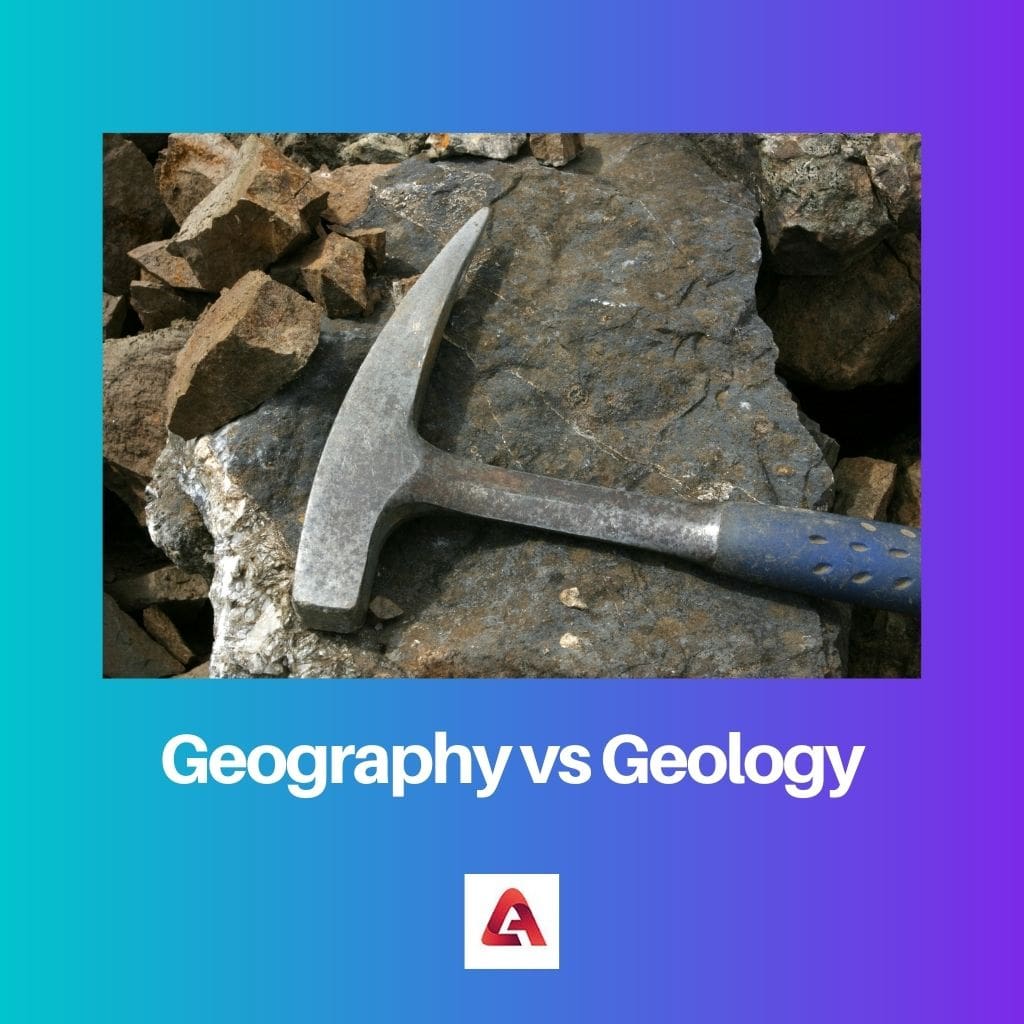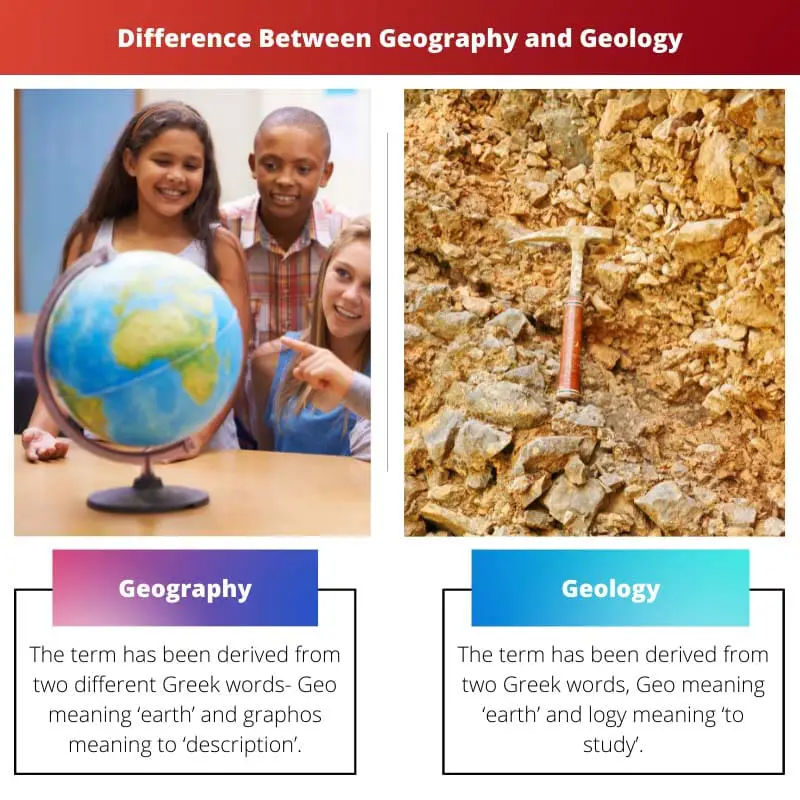Geography primarily focuses on the study of the Earth’s surface, including its features, climates, and human activities. Geology, on the other hand, delves into the Earth’s structure, composition, and the processes that have shaped its history, such as tectonic movements and erosion.
Key Takeaways
- Geography studies the Earth’s physical features, human societies, and the interactions between them.
- Geology examines the Earth’s structure, composition, and processes that shape it over time.
- Geography focuses more on spatial relationships and human-environment interactions, while geology emphasizes the Earth’s history and natural processes.
Geography vs Geology
The difference between Geography and Geology is that the former is concerned with the study of the surface of the earth. It analyses and explains the spatial differences in the earth’s surface’s physical, biological and human features and explores their remarkable regional patterns and interrelationships.

Geography studies the earth regarding its physical, biological and human features. It explores the spatial variations of these features and analyses their interrelationships and regional patterns.
Geology, on the other hand, studies the origin of the earth, its structure, composition and the history of its development. Human beings constitute only a negligible part of that history.
On the other hand, the latter is primarily concerned with the subsurface of the earth. That is to say, it deals with what lies beneath the earth’s surface.
It studies and describes the earth’s origin, structure, anatomy and developmental history.
Comparison Table
| Feature | Geography | Geology |
|---|---|---|
| Focus | Earth’s surface, its features, and the processes shaping them | Earth’s composition, structure, and the processes that have shaped it over time |
| Scope | Studies the physical (landforms, climate, vegetation, etc.) and human (population, culture, economy, etc.) aspects of Earth’s surface | Primarily concerned with the physical aspects, including rocks, minerals, fossils, and landforms formed by geological processes |
| Timeframe | Considers both present-day and historical aspects of Earth’s surface | Focuses primarily on the long-term, historical perspective, studying Earth’s formation and evolution over billions of years |
| Applications | Understanding environmental issues, resource management, urban planning, regional development, and cultural studies | Understanding natural hazards, resource exploration (oil, minerals), construction planning, and environmental remediation |
| Related fields | Climatology, oceanography, cartography, sociology, anthropology | Paleontology, petrology, geophysics, geochemistry |
What is Geography?
Introduction to Geography:
Geography is a multifaceted discipline that explores the Earth’s landscapes, environments, and human societies. It encompasses a diverse range of topics, including physical geography, human geography, environmental geography, and geospatial sciences. At its core, geography seeks to understand the interconnectedness of natural and human systems and their influence on the planet.
Physical Geography:
Physical geography examines the natural processes and features of the Earth’s surface, such as landforms, climates, vegetation, and ecosystems. It investigates phenomena like weather patterns, erosion, plate tectonics, and the distribution of resources. Through methods such as remote sensing, GIS (Geographic Information Systems), and fieldwork, physical geographers analyze spatial patterns and dynamics to comprehend how the Earth’s physical environment functions and changes over time.
Human Geography:
Human geography focuses on the interactions between human societies and their environments. It explores topics such as population dynamics, urbanization, cultural landscapes, economic activities, and political systems. Human geographers investigate how humans shape the environment through activities like agriculture, urban development, and resource exploitation, as well as how environmental factors influence human behavior and societal patterns. By studying the spatial distribution of populations, cultures, and activities, human geographers gain insights into the complexities of human-environment relationships and their impacts on global sustainability and well-being.

What is Geology?
Introduction to Geology:
Geology is the scientific study of the Earth’s structure, composition, history, and the processes that have shaped its development over billions of years. It is a multidisciplinary field that integrates elements of chemistry, physics, biology, and mathematics to unravel the mysteries of our planet. Geologists investigate everything from the formation of mountains and the movement of continents to the origin of minerals and the evolution of life.
Physical Geology:
Physical geology focuses on understanding the materials and processes that make up the Earth’s surface and interior. It examines phenomena such as plate tectonics, volcanism, earthquakes, erosion, and sedimentation. Through fieldwork, laboratory analysis, and computational modeling, physical geologists explore the forces and mechanisms responsible for shaping the Earth’s landforms and geological features. By studying rock formations, stratigraphy, and geological structures, they reconstruct the history of the Earth and decipher the sequence of events that have shaped its landscape over time.
Historical Geology:
Historical geology investigates the evolution of the Earth and its life forms through deep time. It examines the geological record preserved in rocks, fossils, and other geological features to reconstruct past environments, climates, and ecosystems. By dating rocks and correlating geological strata, historical geologists unravel the timeline of major geological events, such as the formation of continents, the rise and fall of ancient seas, and the mass extinctions that have punctuated Earth’s history. Through their research, historical geologists provide valuable insights into the long-term processes that have shaped the Earth and the complex interplay between geological and biological evolution.

Main Differences Between Geography and Geology
- Here are the main differences between Geography and Geology:
- Focus:
- Geography primarily focuses on the study of the Earth’s surface, including its features, climates, and human activities.
- Geology focuses on the Earth’s structure, composition, and the processes that have shaped its history, such as tectonic movements and erosion.
- Approach:
- Geography encompasses a broader understanding of spatial relationships, human-environment interactions, and societal patterns.
- Geology delves deeper into the Earth’s physical makeup and the forces that have shaped it over time, employing methods such as fieldwork, laboratory analysis, and computational modeling.
- Sub-disciplines:
- Geography includes sub-disciplines like physical geography, human geography, environmental geography, and geospatial sciences.
- Geology includes sub-disciplines like physical geology, historical geology, mineralogy, petrology, and sedimentology, each focusing on different aspects of the Earth’s structure and history.

- https://en.m.wikipedia.org/wiki/Geography
- https://www.nationalgeographic.org/education/what-is-geography/

This article effectively illustrates the core disparities between geography and geology. It serves as a valuable resource for students and enthusiasts of earth sciences.
Absolutely. It’s an insightful piece that encapsulates the essence of both disciplines.
The detailed comparison between geography and geology offers fascinating insights into their distinct roles within earth sciences. An engaging and informative read.
A thoroughly elucidating analysis of the fundamental disparities between geography and geology. Well-crafted piece.
Indeed, the article adeptly captures the nuanced differences between geography and geology.
This article provides a great insight into the differences between geography and geology. It illustrates the unique features of each discipline and their areas of focus.
I agree with you. It’s an informative and well-explained article.
This article presents a clear and concise breakdown of geography and geology. It’s an enriching read for those interested in earth sciences.
A well-articulated piece that captures the essence of geography and geology.
I couldn’t agree more. It’s both informative and engaging.
The comprehensive explanation of geography and geology in this article is commendable. It provides an in-depth understanding of the two disciplines and their domains.
Absolutely, the article does an excellent job of addressing the key differences between geography and geology.
It’s interesting to see the detailed comparison and contrast between geography and geology. Well-written piece.
I found this article to be quite enlightening. It gives a clear distinction between geography and geology and highlights their significance in the study of the earth.
I think the article could have delved a bit deeper into certain aspects, but overall, it’s informative.
The author offers a compelling comparison between geography and geology, shedding light on their distinct characteristics and contributions to earth sciences.
Indeed, the article effectively highlights the unique perspectives and objectives of geography and geology.
While the article offers a good overview of geography and geology, it lacks a critical analysis of the interdisciplinary nature of these fields.
I tend to agree. It could benefit from a more in-depth exploration of interdisciplinary connections.
While the article provides a comprehensive understanding of geography and geology, a more critical debate on the evolving trends within these fields could enhance its academic value.
I concur. An exploration of contemporary developments would undoubtedly enrich the scholarly merit of the article.
The article seems to cover the basics of geography and geology adequately, but it could dive deeper into the practical applications and contemporary relevance of these fields.
Agreed. A more extensive examination of real-world applications would enhance the article’s depth.
I share your sentiment. It would be beneficial to explore the modern-day implications of geography and geology.